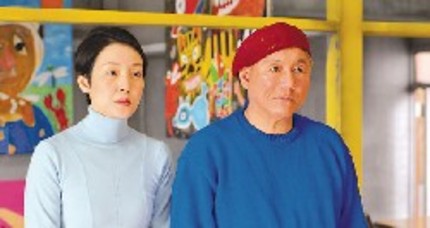TIFF Review: ACHILLES AND THE TORTOISE

The concluding chapter of the self relective trilogy that Japanese icon Takeshi Kitano began with Takeshis' and continued with Glory to the Filmmaker it is hard to imagine Achilles and the Tortoise being more different than the films that came before. While both Takeshis' and Glory were shot through with manic energy and featured Kitano playing some distorted version of himself Achilles is a far more sedate and quiet film, one that follows a conventional structure, following a single character through the course of his life, and is concerned more with the creative impulse than with any sort of self representation. If Takeshis' was an attempt to break new stylistic ground while satirizing the media monster Kitano himself had become and Glory was a deliberate throwback to the comedic madness of Getting Any, then Achilles draws more on the meditative side of Kitano, the side responsible for films such as Dolls and A Scene At The Sea.
Achilles and the Tortoise is the story of Machisu. A young boy when we first meet him, Machisu's father is a wealthy businessman largely responsible for the financial well being of his entire town. Machisu's father is also a largely ignorant but very passionate lover of modern art, a passion he indulges by buying large quantities of paintings of questionable worth - paintings foisted off on him by an unscrupulous art dealer fully aware that his wealthy client will never have any idea whether what he's buying is any good or not. When Machisu shows that he has inherited his father's love of art he is encouraged to indulge that particular love, given free rein to pursue painting and drawing above all else. Unfortunately, Machisu has also inherited lack of skill and taste.
Tragedy strikes and Machisu is left an orphan but he never abandons his all-consuming love of art, constantly sketching and drawing and painting, sinking whatever money he makes into supplies and lessons, constantly pursuing his goal of become a recognized painter. But he never really does. The son of Machisu's father's art dealer proves no help, disparaging Machisu's early work as being too old fashioned and constantly suggesting that he become more daring, more experimental, more whatever the buzz word of the day may be - suggestions that Machisu follows slavishly without ever making any progress. He ages, marries, has a daughter, but never makes any progress whatsoever when it comes to infiltrating the art world.
With the title taken from Zeno's Paradox - a famous mathematical proof that it is impossible to catch anything you may pursue, regardless of how much faster than it you may be, a proof that eventually led directly to the creation of calculus - the question of the film is whether Machisu's artistic career is destined to fail because he lacks talent or if he is destined to fail because he pursues success as defined by other people's opinions rather than simply following his own feelings and inclinations? Kitano is clearly aiming for the second option with the entire film standing as a comment on the absuridty of commercialized art.
Achilles and the Tortoise is a quiet, meditative bit of work from Kitano, the humor - it is frequently very funny - drawing more quiet smiles than outright laughs. It is elegantly constructed and well acted, a film that would have drawn much more attention had it come at the beginning of this self reflective cycle of films rather than at the end. Though certainly not a-list Kitano it is a huge step forward from the mostly disastrous Glory to the Filmmaker and a very positive sign for what is to come.
Notable here are two key points: first, all of the paintings in the film are the creations of Kitano himself. In addition to being a prominent writer, director, actor and television personality in his native Japan, Kitano has become a fairly prolific painter in recent years, one of his paintings previously featured prominently in cult hit Battle Royale. And, second, this is definitely the end of Kitano's self-reflective period - he has already announced that his next film will be a samurai picture - though not Zatoichi 2 - and that he is closing the book on this phase of his film career.






